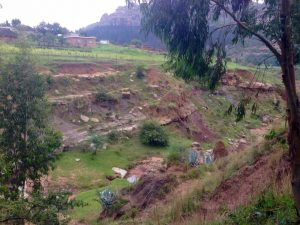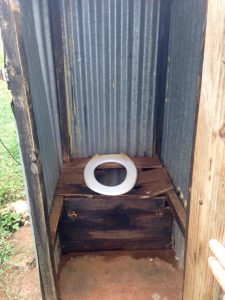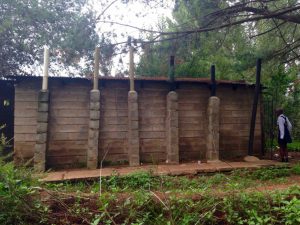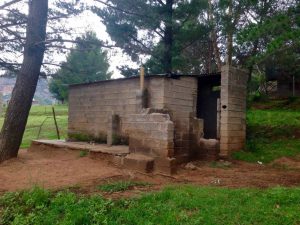This project is made possible through the partnership of WATER CHARITY and the NATIONAL PEACE CORPS ASSOCIATION. ![]()
This project has been completed. To read about the conclusion, CLICK HERE.
 Location
Location
Makhobalo High School, Ha Khabo, Leribe District, Lesotho
Community Description
Makhobalo High School is located in Ha Khabo, which is the center of the community of the Pela-Tsoeu constituency. Ha, Khabo is the most densely populated community within Leribe district, consisting of about 2,500 people located on the road leading to Ts’ehlanyane National Park. It is one of the oldest communities that has been expanding every year in the past twenty years, because of the all of the services, like a postal office, military base, government office, large clinic, and a variety of schools all within walking distance. Within the area, there are several schools, an Agricultural Vocational School, and a nearby military base.
To live in Ha Khabo means there is never a dull moment. There are always events going on at Makhobalo’s School grounds, such as sporting events from the district to regional level, World Vision events that involve the Queen of Lesotho, political events with the prime minister, Agriculture events, and development studies and science fairs for the region. Most recently, the school hosted an event that included Help Lesotho, DREAM, Blue Cross, New Start, and Girl4ce to present to the students on various topics on everything from forced child marriage to HIV/AIDS.
 Problem Addressed
Problem Addressed
Ha Khabo is an active community and Makhobalo High School is at the center of that. The school hosts about 2-3 events a month with an average attendance of 1,500 per event. The highest record of attendance was this year with 3,500 people in attendance. Although the school grounds have the ability to host this many people, the facilities cannot.
They currently have one toilet for community events, and it is for women only. Although this restricts the school’s ability to adequately host major events, the show must go on and Makhobalo must find a way to be allowed to continue to prosper and have adequate facilities.
Along with the increase in community events, Makhobalo has been rising in the ranks of top schools in the Leribe District, currently ranking in the top ten. This year they had 350 new applicants raising the total of students to 800. This leaves the school with only eight barely useable toilets for even more students (4 for the girls, and 4 for the boys) to share.
With this extreme lack of facilitates there are problems with the girl students, and the environment. Without a clean, and safe space for female students to relieve and clean themselves during their menstruation, there an increase in absences at school, as well as at community events.
Overall, the lack of facilities entices students and visitors to relive themselves in the nearby empty ravine. This is unsanitary, bad for the environment, and has the potential to contaminate the drinking water. Although the students see this empty ravine as an alternative, after a big rainstorm, the ravine fills with water and eventually connects to the river.
 Project Description
Project Description
This project is to build 18 toilets/pit latrines at the school. They will be used for community and school events, Makhobalo High School students and staff, and the families that board at the school.
A local contractor has identified accessible locations for the latrines and drawn up sketches. The latrines will provide a safe area for females to clean their reusable pads, and properly dispose of used pads.
The plans have also been reviewed by the local Ministry of Health and World Vision representative. Along with the contractor, a member of the community has brought his brick-making machine to teach the students how to make bricks that will be used for the latrines.
The school has brought together the community members who are going to donate labor, supplies and some money.
The students, along with other members of the community, will help to make the bricks and build the latrines.
Water Charity funds will be used to purchase materials for the latrines. These include cement, plywood, roofing and toilet seats.
Project Impact
3,500 people will benefit from the project.
Peace Corps Volunteer Directing Project
Karina Guerrero
 Monitoring and Maintenance
Monitoring and Maintenance
After the completion of the project, the upkeep and management will be minimal. The school will be in charge of the keys that contain the locks for toilets; they will also manage the rotation of students who will clean the school latrines and repair any damages.
When it comes to community events, the person in charge of the event will receive the keys to the toilets and be in charge of the clean-up after the event.
Since these are pit latrines that will become filled one day, they will be in a location with easy access by car so that a waste service can come and help dispose of the buildup.
The students, teachers and community who all contributed to this project will also have ownership of the project and participate in the sustainability of maintenance under the direction of Makhobalo High School.
Let Girls Learn
Although not an official Let Girls Learn project, it accrues largely to the benefit of girls, so we include it under our Let Girls Learn Initiative – Worldwide.
This project will benefit the girls of Makhobalo High School immensely and is sure to increase attendance at class and school events. These new latrines will provide the girls with a safe, clean, and reliable place to relieve themselves and take care of their personal hygiene needs while they are menstruating.
Project Funding
This project has been funded by an anonymous donor.
Conclusion of Makhobalo High School Latrine Project – Lesotho
This project has been completed under the direction of Peace Corps Volunteer Karina Guerrero. To read about the start of the project, CLICK HERE.
The project was designed to build 18 toilets/pit latrines at the school.
Karina reports:
I am so happy to inform you that the project is now complete!!!!! 🙂 We are so excited to have 18 beautiful, clean toilets that are going to last for many years to come.
The process to build 18 pit latrines took four and a half months, four teachers, 6 builders, and majority of Makhobalo High School’s students. My counterpart and lead of the planning committee, M’e Sepanya was a determined, diligent leader who handled every challenge in a timely appropriate manner.
The planning committee started to gather quotes and ID sites with local contractors in January, so once they agreed on a contractor we started to go purchase supplies. We were going to purchase bricks but instead the planning committee found a local contractor who would make the bricks for half the price. The bricks took one and half months to make, and the planning committee was organized and on top of maintaining supplies for the workers to complete in a timely manner.
When the bricks were almost completed the labors came in to start digging pits. Upon completion of the first pit some of the labors started to construct the buildings while the others completed digging the holes.
The process was simple and smooth. Most difficulties came from weather issues, and vendors who were delivering supplies. Regardless of the problem the planning committee was a force that negotiated, and made sure we got what we paid for.
Overall this huge project went so smoothly because Makhobalo High School was driven, and determined to finally have new toilets. Everyone came together to help make this project a success. The students stood after school numerous times to help unload and move supplies, the cooks prepared lunch for the laborers, and the overall the staff came together to help talk to the vendors.
Thank you so much for your donation. It truly created a difference in my community.
We extend our thanks to Karina for completing this important project.